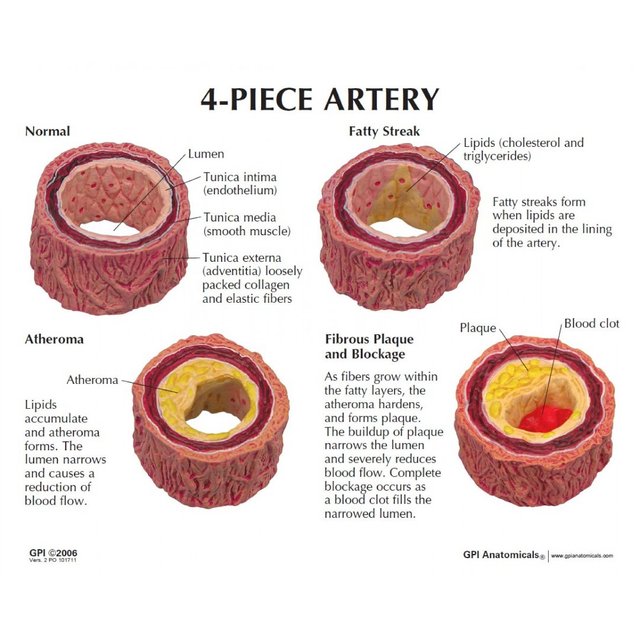
Image source: www.gpianatomicals.com
It has been written and drilled into our heads over and over again that cholesterol is the villain. However, once again this dissemination of information is inaccurate and false.
I will outline what the role of arterial plaque is and why it is not deleterious to our health directly, but only indirectly due to the fact that it is simply the body doing it's job to keep us healthy, which in a nutshell is the only true goal of the body. As I have written many times, the body's only function is to heal itself as it intrinsically knows.
Arterial plaque is beneficial and necessary for our human body (that's right, beneficial). Knowing this allows you to be understand the role of cholesterol. The role of plaque is can be compared to the role of cement repair on a wall. If there is any damage tot he arterial wall, your body intrinsically knowns that it has to put together some plaque, which is derived from cholesterol, calcium and fibrin from the bloodstream in order to patch the damages before the arterial walls become compromised and start to leak, which would inevitably cause you to start bleeding internally. Cholesterol is not part of the problem, it's actually part of the solution - to a different problem of course. This is why I said the body knows how and when to heal itself, but as most ailments in the body, they are not always caused by the location of the pain or the ailment. Normally, the ailment or pain are due to some other factor, which is manifesting into the actual physical symptom. This is why the medical industry has such a poor record when it comes to treating the body because it is a symptom-based industry that only tries to put band aids on the "physical" areas affected and does not consider the body as a whole and complete unit. This is where holistic and functional medicine come in.
Here are some of the antiquated, but common assumption of the cholesterol theory pertaining to heart disease.
Q1: Does eating a high cholesterol diet lead to heart disease?
Ans: Definitely and unambiguously "NOT". If we simply take a look at the results from the Atkins Diet, which as a by product is known to lower cholesterol, we know that this is not true. The Atkins Diet is a diet that encourages the consumption of high-cholesterol foods, including large amounts of meat and dairy. The only restrictions are synthetic trans-fats and refined carbs. So a diet that focuses on high-cholesterol foods has been proven to product low cholesterol over and over again - not much needs to be said about that.
Q2: Does eating high-saturated fat diet lead to heart disease?
Ans: Once again a resounding NO! If we consider the Eskimo diet, which is probably the most saturated fat-laden diet on this planet, then the Eskimos should be extinct. Think about it, they literally eat the highest amount of saturated fat via the whale and seal blubber they consume in high amounts. Eskimos are known to have no heart disease at all - not until they shift to the Western diet that is. Now this is not to say that the Atkins Diet and the Eskimo diet don't come with their own health problems, but when it comes to cholesterol, and this is the point I am trying to make, well commons sense will tell you no. For the sake of knowledge, Eskimos due deal with an increased rate of osteoporosis due to their high saturated-fat diets promoting high amounts of acid in their body tissues.
Q3: Does lowering cholesterol in the diet create a reduction in bloodstream cholesterol?
Ans: Based on clinical evidence, the answer is no.
Q4: Does lowering cholesterol in the bloodstream reduce the formation of new plaques?
Ans: As a general rule, no it does not. The primary reason for this could be due to the fact that you have not minimized or even found the source of the problem.
Q4: Do statin drugs reduce heart attack and stroke?
Ans: Yes, but not because of the ability to lower cholesterol, which is what they claim to do. We know cholesterol is not the culprit, therefore the whole approach to statins is a sham. Additionally, not only do they not do what they claim, they come with a slew of undesirable side effects, as most synthetic/pharmaceutical drugs do.
To your health.